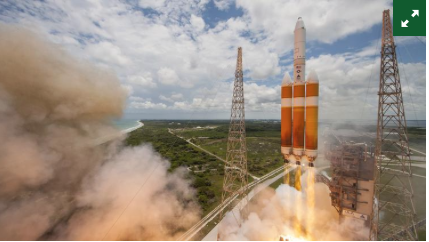
A Delta IV Heavy rocket, made by Centennial-based United Launch Alliance.
United Launch Alliance is again cutting jobs as it seeks to become more price-competitive with Elon Musk’s SpaceX and other rocket companies.
The Centennial-based rocketmaker, the largest space launch contractor to the federal government, is seeking voluntary departures to trim an unspecified number of positions.
ULA said it isn’t specifying the number because it considers that competitively sensitive information. The company shed 350 jobs last year through a combination of voluntary buyouts and layoffs and said last summer more cuts would be coming this year.
It has started seeking voluntary departures now in the hope that the majority of the positions being eliminated won’t involve laying off employees involuntarily, ULA spokeswoman Jessica Rye said. ULA is trying to achieve cost savings to make its launch services cheaper while maintaining the reliability customers expect, she said.
“We appreciate all of our team members’ contributions and understand the difficulty and stress that workforce reductions place on the impacted employees and their families,” she said.
ULA employed about 3,750 in 2015, about 1,700 of them locally.
Last year, ULA suggested it could dip to about 3,000 employees by the end of 2017. Taking last year’s workforce reductions into account, that would suggest the company may eliminate 400 positions this year.
ULA—headquartered at Interstate 25 and Dry Creek Roadis a 10-year-old joint venture of Lockheed Martin Corp and Boeing Co., the result of merging their rocketry divisions.
It has been the sole provider of major military space launches and it has dominated NASA’s science mission launches. But that's starting to change.
Hawthorne, California-based SpaceX (also known as Space Exploration Technologies Corp.) won its first launch contract for the U.S. Air Force last year and has been launching NASA cargo missions for several years.
ULA has been designing a rocket line, called Vulcan, that will eventually replace both its Atlas V and Delta IV rocket families and will be a cheaper rocket to offer customers.
In an interview last year, CEO Tory Bruno said he expects ULA to shift to having only half its rocket orders come from the US military launches and the rest made up of civilian government agency orders and commercial launch contracts.
But doing that requires getting leaner to bring prices down and be able to win commercial orders for which ULA has historically been considered too expensive, Bruno has said. He predicts ULA will grow again and add jobs from the increased business it gets.
SpaceX prices its cheapest launches as low as $62 million. ULA launches have typically been more than double that.
Bruno is pushing to get its cheapest launches below $100 million, using more efficient manufacturing, 3-D printing and getting smaller as an employer.
ULA has unmatched record of reliability. It has notched 114 consecutive successful missions since 2006.
SpaceX has lost rockets to accidents twice in the past 19 months. It has launched one Falcon 9, a successful satellite delivery, since a launchpad explosion on September 1.

